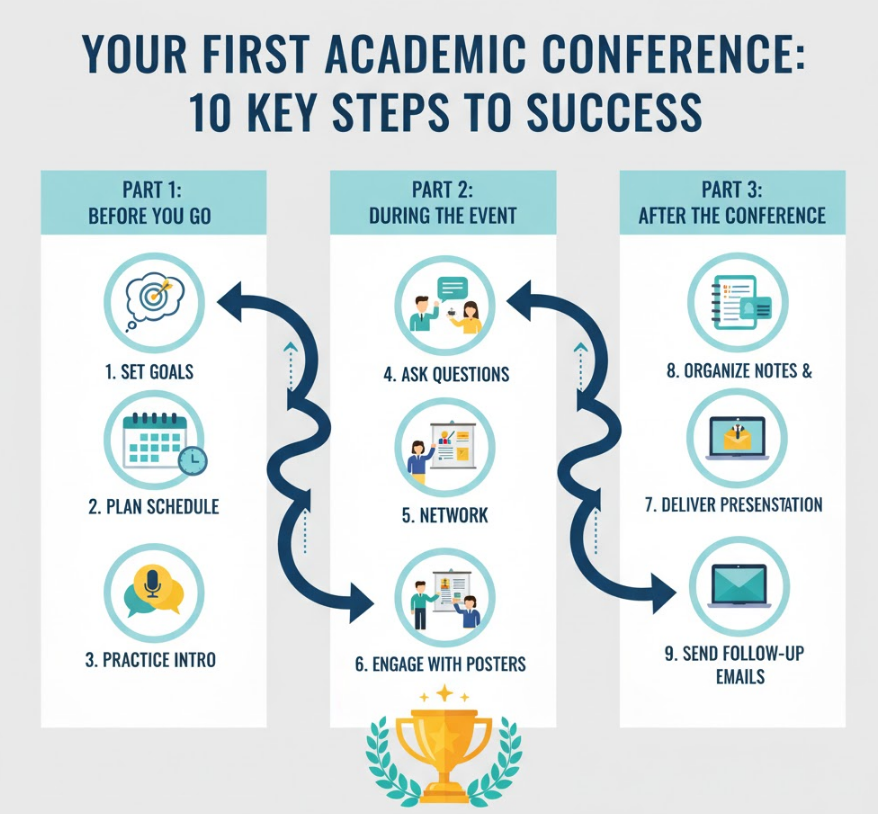

135 views||Release time: Oct 15, 2025
The acceptance email has arrived, the registration is complete, and your first academic conference is just around the corner. It's an exciting milestone, but it can also be incredibly intimidating. With hundreds of talks, dozens of posters, and a sea of experts, where do you even begin?
A successful first conference experience is all about preparation and proactive engagement. It’s your chance to learn, network, and become an active member of your research community. This guide breaks down the entire experience into 10 key steps to help you navigate your first conference with confidence and come away with valuable connections and insights.

Step 1: Define Your "Why" – Set Clear Goals Before you go, ask yourself: What do I want to achieve? Having a few simple goals will give your attendance purpose. Examples include:
Get feedback on my poster from at least three people.
Introduce myself to a specific professor whose work I admire.
Understand the latest trends in a new sub-field.
Meet two other PhD students working on a similar topic.
Step 2: Plan Your Schedule – Don't Just Wander The conference program can be overwhelming. Don't leave your schedule to chance.
Study the Program: A week before, go through the entire program online.
Prioritize: For each time slot, select one "must-see" talk and a backup in case the first one isn't what you expected.
Schedule Everything: Don't just plan which talks to attend. Intentionally schedule time for poster sessions, coffee breaks, and even a 30-minute break to decompress.
Step 3: Prepare Your 30-Second Introduction You will be asked, "What do you do?" countless times. Prepare a concise and clear "elevator pitch" about your research.
Template: "Hi, I'm [Your Name], a [Your Position] from [Your University]. I work on [your broad topic], and I'm specifically focused on [your specific research question or method]."
Step 4: Pack for Success
Attire: Opt for business casual. It's better to be slightly overdressed than underdressed. Comfortable shoes are non-negotiable.
Essentials: Pack a notebook, pens, a portable charger/power bank, and any necessary adapters for the country you're visiting.
Networking Tools: Bring business cards with your name, title, university, and a link to your LinkedIn or professional website.
Step 5: Be an Active Participant, Not a Passive Listener Don't just sit in the back of the room. Arrive a few minutes early to get a good seat. Take notes during the presentation and think of a potential question. Engaging with the material will help you learn more and make you more visible.
Step 6: Master the Coffee Break (It’s Not About the Coffee) This is where the real networking happens. It’s your prime opportunity to chat with speakers and other attendees in a relaxed setting.
Easy Conversation Starters: "What did you think of the keynote talk?" or "Hi, I'm [Your Name]. I saw from your name tag that you're from [University]. What do you work on?"
Step 7: Engage with the Posters Poster sessions are a fantastic, low-pressure way to interact directly with researchers. Walk through the aisles, and if a poster catches your eye, stop and read it. Ask the presenter to give you their "two-minute pitch." It's a great way to have in-depth conversations.
Step 8: Ask a Good Question If you have a relevant and thoughtful question during a Q&A session, ask it! It’s one of the best ways to show you are engaged. Introduce yourself ("Hi, [Your Name] from [Your University]"), compliment the speaker ("Thanks for a great talk"), and ask your question concisely.
Step 9: Organize Your Notes and Contacts While the information is still fresh, review the notes you took. On the back of the business cards you collected, jot down a key point from your conversation to jog your memory later.
Step 10: Send a Polite Follow-Up Email This is the step that turns a brief chat into a lasting connection. Within a few days of the conference, send a short, personalized email to the key people you met.
Keep it brief: Remind them who you are and where you met.
Reference your conversation: "I really enjoyed our chat about [topic]."
Have a purpose: Suggest connecting on LinkedIn or mention an article you discussed.
Conclusion Your first academic conference is a significant step in your journey as a researcher. By preparing in advance, engaging actively during the event, and following up afterward, you can transform an intimidating experience into a powerful opportunity for learning, networking, and career growth.